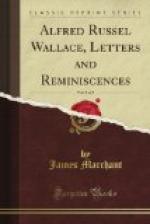[64] A medium.
[65] The lecture at the Royal Institution, when he wore the Order.
[66] In Nature, Nov. 20, 1913, p. 348.
[67] “The Wonderful Century,” p. 437.
[68] “I have been speculating last night,” wrote C. Darwin to his son Horace, “what makes a man a discoverer of undiscovered things; and a most perplexing problem it is. Many men who are very clever—much cleverer than the discoverers—never originate anything. As far as I can conjecture, the art consists in habitually searching for the causes and meaning of everything which occurs.”—“Emma Darwin,” p. 207.
[69] It is interesting to compare this with Darwin’s manner of writing. Darwin confessed: “There seems to be a sort of fatality in my mind leading me to put at first my statement or proposition in a wrong or awkward form. Formerly I used to think about my sentences before writing them down; but for several years I have found that it saves time to scribble in a vile hand whole pages as quickly as I possibly can, contracting half the words; and then correct deliberately. Sentences thus scribbled down are often better ones than I could have written deliberately.”
[70] See pp. 227, 234.
[71] But see ante, p. 153.
[72] Wallace’s section of the Darwin-Wallace Essay entitled “On the Tendency of Species to form Varieties; and on the Perpetuation of Varieties and Species by Natural Means of Selection.”



